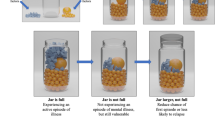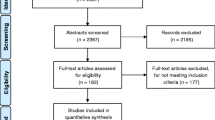Abstract
Individuals with 22q11.2 deletion syndrome (22q11.2DS) have an increased chance of developing a psychiatric disorder. While parents of children affected by 22q11.2DS typically receive counseling about risk for non-psychiatric health concerns, genetic counselors may be reluctant to discuss psychiatric risk. Further education of genetic counselors may be necessary to encourage discussion of psychiatric risk with these families. The goal of this project was to develop recommendations for genetic counselors to provide psychiatric risk information to families affected by 22q11.2DS. The recommendations were developed by synthesizing resources in the literature about risk communication. These recommendations were refined following an online focus group meeting with five health care professionals who were recruited for participation from 22q11.2DS clinics across the U.S.A. The focus group data revealed three themes related to discussion of psychiatric risk: 1) Stepwise approach, 2) Discussing treatment options and reducing risks, and 3) Addressing stigma. These recommendations may be used as a foundation for a future clinical protocol to encourage discussion about the risk for psychiatric illness at an earlier point in the diagnostic process for 22q11.2DS and to provide improved information, support and resources to affected families.
Similar content being viewed by others
References
Anderson, K., & Austin, J. C. (2012). Effects of a documentary film on public stigma related to mental illness among genetic counselors. Journal of Genetic Counseling, 21, 573–581.
Austin, J. C., & Honer, W. G. (2005). The potential impact of genetic counseling for mental illness. Clinical Genetics, 67(2), 134–142. doi:10.1111/j.1399-0004.2004.00330.x.
Austin, J. C., & Honer, W. G. (2007). The genomic era and serious mental illness: a potential application for psychiatric genetic counseling. Psychiatric Services, 58(2), 254–261. doi:10.1176/appi.ps.58.2.254.
Austin, J. C., Palmer, C. G., Rosen-Sheidley, B., Veach, P. M., Gettig, E., & Peay, H. L. (2008). Psychiatric disorders in clinical genetics II: individualizing recurrence risks. Journal of Genetic Counseling, 17(1), 18–29. doi:10.1007/s10897-007-9121-4.
Bassett, A. S., Chow, E. W. C., Husted, J., Weksberg, R., Caluseriu, O., Webb, G. D., et al. (2005). Clinical features of 78 adults with 22q11 deletion syndrome. American Journal of Medical Genetics. Part A, 138A, 307–313. doi:10.1002/ajmg.a.30984.
Bassett, A. S., McDonald-McGinn, D. M., Devriendt, K., Digilio, M. C., Goldenberg, P., Habel, A., et al. (2011). Practical guidelines for managing patients with 22q11.2 deletion syndrome. The Journal of Pediatrics, 159(2), 332–339.e331. doi:10.1016/j.jpeds.2011.02.039.
Baty, B. J. (2009). Risk communication and decision making. In W. R. Uhlmann, J. L. Schuette, & B. M. Yashar (Eds.), A guide to genetic counseling (2nd ed.). Hoboken: John Wiley & Sons.
Beaton, E. A., & Simon, T. J. (2011). How might stress contribute to increased risk for schiozphrenia in children with chromosome 22q11.2 deletion syndrome? Journal of Neurodevelopmental Disorders, 3(1), 68–75. doi:10.1007/s11689-010-9069-9.
Costain, G., & Bassett, A. S. (2012). Clinical applications of schizophrenia genetics: genetic diagnosis, risk, and counseling in the molecular era. The Application of Clinical Genetics, 5, 1–18. doi:10.2147/TACG.S21953.
Costain, G., Chow, E. W., Ray, P. N., & Bassett, A. S. (2012). Caregiver and adult patient perspectives on the importance of a diagnosis of 22q11.2 deletion syndrome. Journal of Intellectual Disability Research, 56(6), 641–651. doi:10.1111/j.1365-2788.2011.01510.x.
Day, E. N. (2003). Public attitudes toward mental illness: Development of an attitude assessment scale. Lawrence: University of Kansas.
Feret, H., Conway, L., & Austin, J. C. (2011). Genetic counselors' attitudes towards individuals with schizophrenia: desire for social distance and endorsement of stereotypes. Patient Education and Counseling, 82(1), 69–73. doi:10.1016/j.pec.2010.02.007.
Finucane, B. (2010). Genetic counseling for women with intellectual disabilities. Genetic counseling practice: Advanced concepts and skills, Kindle version (Chapter 12).
Fung, W. L. A., McEvilly, R., Fong, J., Silversides, C., Chow, E., & Bassett, A. (2010). Elevated prevalence of generalized anxiety disorder in adults with 22q11.2 deletion syndrome. The American Journal of Psychiatry, 167(8), 998. doi:10.1176/appi.ajp.2010.09101463.
Fung, W. L. A., Butcher, N. J., Costain, G., Andrade, D. M., Boot, E., Chow, E. W. C., et al. (2014). Practical guidelines for managing adults with 22q11.2 deletion syndrome. Genetics in Medicine. doi:10.1038/gim.2014.175.
Gabbidon, J., Clement, S., van Nieuwenhuizen, A., Kassam, A., Brohan, E., Norman, I., et al. (2013). Mental Illness: Clinicians' Attitudes (MICA) scale-psychometric properties of a version for healthcare students and professionals. Psychiatry Research, 206(1), 81–87. doi:10.1016/j.psychres.2012.09.028.
Goodship, J., Cross, I., LiLing, J., & Wren, C. (1998). A population study of chromosome 22q11 deletions in infancy. Archives of Disease in Childhood, 79(4), 348–351.
Hercher, L., & Bruenner, G. (2008). Living with a child at risk for psychotic illness: the experience of parents coping with 22q11 deletion syndrome: an exploratory study. American Journal of Medical Genetics Part A, 146A(18), 2355–2360. doi:10.1002/ajmg.a.32466.
Hippman, C., Lohn, Z., Ringrose, A., Inglis, A., Cheek, J., & Austin, J. C. (2013). "Nothing is absolute in life": understanding uncertainty in the context of psychiatric genetic counseling from the perspective of those with serious mental illness. Journal of Genetic Counseling. doi:10.1007/s10897-013-9594-2.
Karas, D. J., Costain, G., Chow, E. W., & Bassett, A. S. (2012). Perceived burden and neuropsychiatric morbidities in adults with 22q11.2 deletion syndrome. Journal of Intellectual Disability Research. doi:10.1111/j.1365-2788.2012.01639.x.
Krueger, R. A., & Casey, M. A. (2009). Focus groups: A practical guide for applied research (4th ed.). Thousand Oaks: SAGE Publications.
Lautenbach, D. M., Hiraki, S., Campion, M. W., & Austin, J. C. (2012). Mothers' perspectives on their child's mental illness as compared to other complex disorders in their family: insights to inform genetic counseling practice. Journal of Genetic Counseling, 21(4), 564–572. doi:10.1007/s10897-011-9420-7.
Lautenbach, D. M., Christensen, K. D., Sparks, J. A., & Green, R. C. (2013). Communicating genetic risk information for common disorders in the era of genomic medicine. Annual Review of Genomics and Human Genetics, 14, 491–513. doi:10.1146/annurev-genom-092010-110722.
Martin, N., Mikhaelian, M., Cytrynbaum, C., Shuman, C., Chitayat, D. A., Weksberg, R., et al. (2012). 22q11.2 deletion syndrome: attitudes towards disclosing the risk of psychiatric illness. Journal of Genetic Counseling, 21(6), 825–834. doi:10.1007/s10897-012-9517-7.
Maxwell, V. (2012). That's just crazy talk. DVD.
McFarlane, W. R., Dixon, L., Lukens, E., & Lucksted, A. (2003). Family psychoeducation and schizophrenia: a review of the literature. Journal of Marital and Family Therapy, 29(2), 223–245.
McGorry, P. D., Killackey, E., & Yung, A. (2008). Early intervention in psychosis: concepts, evidence and future directions. World Psychiatry, 7(3), 148–156.
Mental illness: Underlying causes and approaches for recovery. (2012). Retrieved 7/25/13, from http://www.nsgc.org/Default.aspx?TabId=146
Monaco, L. C., Conway, L., Valverde, K., & Austin, J. C. (2010). Exploring genetic counselors' perceptions of and attitudes towards schizophrenia. Public Health Genomics, 13(1), 21–26. doi:10.1159/000210096.
Morris, E., Inglis, A., Friedman, J., & Austin, J. (2013). Discussing the psychiatric manifestations of 22q11.2 deletion syndrome: an exploration of clinical practice among medical geneticists. Genetics in Medicine. doi:10.1038/gim.2013.31.
Mueser, K. T., Deavers, F., Penn, D. L., & Cassisi, J. E. (2013). Psychosocial treatments for schizophrenia. Annual Review of Clinical Psychology, 9, 465–497. doi:10.1146/annurev-clinpsy-050212-185620.
Murphy, K. C., & Owen, M. J. (2001). Velo-cardio-facial syndrome: a model for understanding the genetics and pathogenesis of schizophrenia. British Journal of Psychiatry, 179, 397–402.
Peay, H. L., Veach, P. M., Palmer, C. G., Rosen-Sheidley, B., Gettig, E., & Austin, J. C. (2008). Psychiatric disorders in clinical genetics I: addressing family histories of psychiatric illness. Journal of Genetic Counseling, 17(1), 6–17. doi:10.1007/s10897-007-9120-5.
Radomsky, E. D., Haas, G. L., Mann, J. J., & Sweeney, J. A. (1999). Suicidal behavior in patients with schizophrenia and other psychotic disorders. The American Journal of Psychiatry, 156(10), 1590–1595.
Scambler, P. J. (2000). The 22q11 deletion syndromes. Human Molecular Genetics, 9(16), 2421–2426.
Schneider, M., Debbané, M., Bassett, A. S., Chow, E. W. C., Fung, W. L. A., van den Bree, M. B. M., et al. (2014). Psychiatric disorders from childhood to adulthood in 22q11.2 deletion syndrome: results from the international consortium on brain and behavior in 22q11.2 deletion syndrome. The American Journal of Psychiatry, 171(6), 627–639. doi:10.1176/appi.ajp.2013.13070864.
van den Bree, M. B., Miller, G., Mansell, E., Thapar, A., Flinter, F., & Owen, M. J. (2013). The internet is parents’ main source of information about psychiatric manifestations of 22q11.2 deletion syndrome (22q11.2DS). European Journal of Medical Genetics. doi:10.1016/j.ejmg.2013.05.001.
Weil, J. (2002). Genetic counselling in the era of genomic medicine. EMBO Reports, 3(7), 590–593.
Acknowledgments
This project was completed as a capstone experience report at the University of North Carolina at Greensboro. We thank the participants of the focus group, including Anne Bassett, Mindy Dodge, Bettsy Leech, and Elise Sannar, for their insightful and helpful comments on psychiatric risk communication in 22q11.2 deletion syndrome.
Author information
Authors and Affiliations
Corresponding author
Ethics declarations
Conflict of Interest
Authors Sarah J. Hart, Kelly Schoch, Vandana Shashi, and Nancy Callanan declare that they have no conflict of interest.
Human Studies and Informed Consent
All procedures followed were in accordance with the ethical standards of the responsible committee on human experimentation (institutional and national) and with the Helsinki Declaration of 1975, as revised in 2000. Informed consent was obtained from all participants for being included in the study. Additional informed consent was obtained from all participants for which identifying information is included in the acknowledgement section of this article.
Animal Studies
No animal studies were carried out by the authors for this article.
Rights and permissions
About this article
Cite this article
Hart, S.J., Schoch, K., Shashi, V. et al. Communication of Psychiatric Risk in 22q11.2 Deletion Syndrome: A Pilot Project. J Genet Counsel 25, 6–17 (2016). https://doi.org/10.1007/s10897-015-9910-0
Received:
Accepted:
Published:
Issue Date:
DOI: https://doi.org/10.1007/s10897-015-9910-0




